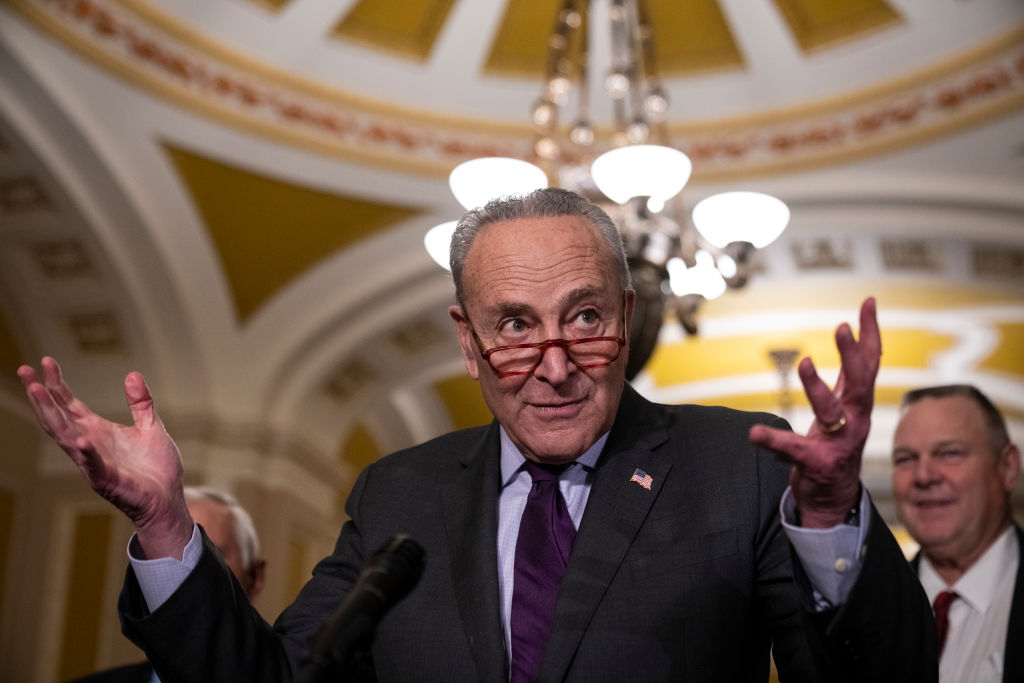Start spreading the news. As party leadership for the upcoming 118th Congress shapes up, we now know that Democrats will have not only New Yorkers but Brooklynites as their top men in both the Senate and the House. Chuck Schumer is poised to maintain his position as Senate majority leader after Republicans’ miserable results in the upper body. And with the departure of Nancy Pelosi as House head honcho, it will be Representative Hakeem Jeffries taking her place and hoping one day to be speaker himself.
So what will an all-Empire State Democrat leadership mean for the rest of the nation?
To get a sense of this, it’s worth looking at the unexpected and outsized role that New York played in the recent midterm elections. Owing to a shockingly good showing from gubernatorial candidate Lee Zeldin, five Democrat seats were flipped, including that of the Democratic Congressional Campaign Committee chair, Sean Patrick Maloney, while all GOP seats were held, including Nicole Malliotakis’s swing district in Staten Island and Brooklyn. In large part, this was owing to a slate of GOP candidates who were more transactional than ideological, a basic trait of New York politics.
Take, for example, the 13 House Republicans who voted for Joe Biden’s massive infrastructure bill. Four of them represent New York, along with two from next door New Jersey. That is almost half the total GOP votes from these two states. At the time, many conservatives were apoplectic, demanding that these RINOs be primaried. Yet all of the New York members won reelection easily, in part because they could tout having brought billions to the state in the infrastructure package.
By and large, this is a bipartisan feature of the New York voter. They send people to Congress to bring back the pork, and Schumer and Jeffries both have solid track records in that regard. This is especially true of Schumer, whose name is emblazoned on half the recent civic structures in the state. In this respect, we might expect Jeffries to hew a bit closer to Schumer than his predecessor Nancy Pelosi, avoiding knock-down, drag-out fights over cultural issues, so long as the check gets cut at the end of the sausage making.
Make no mistake: Jeffries is a liberal, and by the mainstream media’s model can also be called an election denier. But Alexandria Ocasio-Cortez he is not. He first won a seat in Congress in 2012, defeating City Councilman Charles Barron, a far-leftist and alleged antisemite. Jeffries’ success owed to the support of a broad coalition of Brooklyn Democrats, including very centrist Jewish leaders such as Dov Hikind. The new minority leader, the first person of color to serve in that leadership role, is a creature of the New York Democratic Party machine, and atop those gears and levers sits none other than Chuck Schumer.
Both Schumer and Jeffries, along with almost all Democrats, will happily mouth progressive shibboleths when the price is cheap. They will accuse Republicans of fomenting violence with election denialism or by questioning trans surgeries for children. They will gravely nod along to abortion without restriction. But in the end, these are lean, hungry, ambitious men bent more on accomplishment than rhetoric.
But isn’t that the problem Democrats face in a nutshell? They know that progressive superlatives don’t sway even the majority of their own voters, yet are in thrall to an institutional wokeness to which they must always at least genuflect. Jeffries and Schumer may be in the best position to walk this line. But it won’t be easy, especially for Jeffries who will have to do so from the minority and with the Squad squawking at him.
The story of the 2022 midterms was dominated by New York, and now so too is the Democratic Party in Congress. Schumer and Jeffries should have six years to guide and mold their respective caucuses, to get them into a New York state of mind, so to speak, and to make them a force that can at once pronounce all the orthodox progressive prayers while also churning out goodies for their constituents. It’s not an easy task, but when it comes to talking out of both sides of the mouth, nobody is quite so gifted as New Yorkers.

























